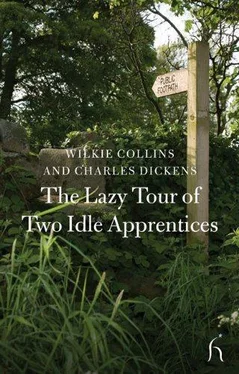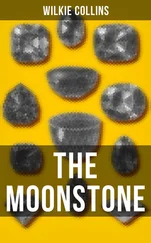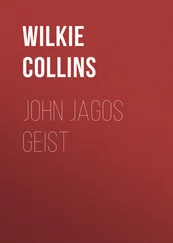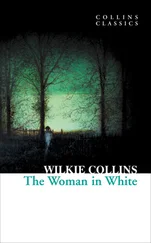Wilkie Collins - The Lazy Tour of Two Idle Apprentices
Здесь есть возможность читать онлайн «Wilkie Collins - The Lazy Tour of Two Idle Apprentices» весь текст электронной книги совершенно бесплатно (целиком полную версию без сокращений). В некоторых случаях можно слушать аудио, скачать через торрент в формате fb2 и присутствует краткое содержание. Жанр: Классическая проза, на английском языке. Описание произведения, (предисловие) а так же отзывы посетителей доступны на портале библиотеки ЛибКат.
- Название:The Lazy Tour of Two Idle Apprentices
- Автор:
- Жанр:
- Год:неизвестен
- ISBN:нет данных
- Рейтинг книги:5 / 5. Голосов: 1
-
Избранное:Добавить в избранное
- Отзывы:
-
Ваша оценка:
- 100
- 1
- 2
- 3
- 4
- 5
The Lazy Tour of Two Idle Apprentices: краткое содержание, описание и аннотация
Предлагаем к чтению аннотацию, описание, краткое содержание или предисловие (зависит от того, что написал сам автор книги «The Lazy Tour of Two Idle Apprentices»). Если вы не нашли необходимую информацию о книге — напишите в комментариях, мы постараемся отыскать её.
The Lazy Tour of Two Idle Apprentices — читать онлайн бесплатно полную книгу (весь текст) целиком
Ниже представлен текст книги, разбитый по страницам. Система сохранения места последней прочитанной страницы, позволяет с удобством читать онлайн бесплатно книгу «The Lazy Tour of Two Idle Apprentices», без необходимости каждый раз заново искать на чём Вы остановились. Поставьте закладку, и сможете в любой момент перейти на страницу, на которой закончили чтение.
Интервал:
Закладка:
Mr. Idle diverting the conversation to grouse, custards, and bride-cake, Mr. Goodchild followed in the same direction. The bride-cake was as bilious and indigestible as if a real Bride had cut it, and the dinner it completed was an admirable performance.
The house was a genuine old house of a very quaint description, teeming with old carvings, and beams, and panels, and having an excellent old staircase, with a gallery or upper staircase, cut off from it by a curious fence-work of old oak, or of the old Honduras Mahogany wood. It was, and is, and will be, for many a long year to come, a remarkably picturesque house; and a certain grave mystery lurking in the depth of the old mahogany panels, as if they were so many deep pools of dark water—such, indeed, as they had been much among when they were trees—gave it a very mysterious character after nightfall.
When Mr. Goodchild and Mr. Idle had first alighted at the door, and stepped into the sombre, handsome old hall, they had been received by half-a-dozen noiseless old men in black, all dressed exactly alike, who glided up the stairs with the obliging landlord and waiter—but without appearing to get into their way, or to mind whether they did or no—and who had filed off to the right and left on the old staircase, as the guests entered their sitting-room. It was then broad, bright day. But, Mr. Goodchild had said, when their door was shut, ‘Who on earth are those old men?’ And afterwards, both on going out and coming in, he had noticed that there were no old men to be seen.
Neither, had the old men, or any one of the old men, reappeared since. The two friends had passed a night in the house, but had seen nothing more of the old men. Mr. Goodchild, in rambling about it, had looked along passages, and glanced in at doorways, but had encountered no old men; neither did it appear that any old men were, by any member of the establishment, missed or expected.
Another odd circumstance impressed itself on their attention. It was, that the door of their sitting-room was never left untouched for a quarter of an hour. It was opened with hesitation, opened with confidence, opened a little way, opened a good way,—always clapped-to again without a word of explanation. They were reading, they were writing, they were eating, they were drinking, they were talking, they were dozing; the door was always opened at an unexpected moment, and they looked towards it, and it was clapped-to again, and nobody was to be seen. When this had happened fifty times or so, Mr. Goodchild had said to his companion, jestingly: ‘I begin to think, Tom, there was something wrong with those six old men.’
Night had come again, and they had been writing for two or three hours: writing, in short, a portion of the lazy notes from which these lazy sheets are taken. They had left off writing, and glasses were on the table between them. The house was closed and quiet. Around the head of Thomas Idle, as he lay upon his sofa, hovered light wreaths of fragrant smoke. The temples of Francis Goodchild, as he leaned back in his chair, with his two hands clasped behind his head, and his legs crossed, were similarly decorated.
They had been discussing several idle subjects of speculation, not omitting the strange old men, and were still so occupied, when Mr. Goodchild abruptly changed his attitude to wind up his watch. They were just becoming drowsy enough to be stopped in their talk by any such slight check. Thomas Idle, who was speaking at the moment, paused and said, ‘How goes it?’
‘One,’ said Goodchild.
As if he had ordered One old man, and the order were promptly executed (truly, all orders were so, in that excellent hotel), the door opened, and One old man stood there.
He did not come in, but stood with the door in his hand.
‘One of the six, Tom, at last!’ said Mr. Goodchild, in a surprised whisper.—‘Sir, your pleasure?’
‘Sir, your pleasure?’ said the One old man.
‘I didn’t ring.’
‘The bell did,’ said the One old man.
He said BELL, in a deep, strong way, that would have expressed the church Bell.
‘I had the pleasure, I believe, of seeing you, yesterday?’ said Goodchild.
‘I cannot undertake to say for certain,’ was the grim reply of the One old man.
‘I think you saw me? Did you not?’
‘Saw you ?’ said the old man. ‘O yes, I saw you. But, I see many who never see me.’
A chilled, slow, earthy, fixed old man. A cadaverous old man of measured speech. An old man who seemed as unable to wink, as if his eyelids had been nailed to his forehead. An old man whose eyes—two spots of fire—had no more motion than if they had been connected with the back of his skull by screws driven through it, and rivetted and bolted outside, among his grey hair.
The night had turned so cold, to Mr. Goodchild’s sensations, that he shivered. He remarked lightly, and half apologetically, ‘I think somebody is walking over my grave.’
‘No,’ said the weird old man, ‘there is no one there.’
Mr. Goodchild looked at Idle, but Idle lay with his head enwreathed in smoke.
‘No one there?’ said Goodchild.
‘There is no one at your grave, I assure you,’ said the old man.
He had come in and shut the door, and he now sat down. He did not bend himself to sit, as other people do, but seemed to sink bolt upright, as if in water, until the chair stopped him.
‘My friend, Mr. Idle,’ said Goodchild, extremely anxious to introduce a third person into the conversation.
‘I am,’ said the old man, without looking at him, ‘at Mr. Idle’s service.’
‘If you are an old inhabitant of this place,’ Francis Goodchild resumed.
‘Yes.’
‘Perhaps you can decide a point my friend and I were in doubt upon, this morning. They hang condemned criminals at the Castle, I believe?’
‘ I believe so,’ said the old man.
‘Are their faces turned towards that noble prospect?’
‘Your face is turned,’ replied the old man, ‘to the Castle wall. When you are tied up, you see its stones expanding and contracting violently, and a similar expansion and contraction seem to take place in your own head and breast. Then, there is a rush of fire and an earthquake, and the Castle springs into the air, and you tumble down a precipice.’
His cravat appeared to trouble him. He put his hand to his throat, and moved his neck from side to side. He was an old man of a swollen character of face, and his nose was immoveably hitched up on one side, as if by a little hook inserted in that nostril. Mr. Goodchild felt exceedingly uncomfortable, and began to think the night was hot, and not cold.
‘A strong description, sir,’ he observed.
‘A strong sensation,’ the old man rejoined.
Again, Mr. Goodchild looked to Mr. Thomas Idle; but Thomas lay on his back with his face attentively turned towards the One old man, and made no sign. At this time Mr. Goodchild believed that he saw threads of fire stretch from the old man’s eyes to his own, and there attach themselves. (Mr. Goodchild writes the present account of his experience, and, with the utmost solemnity, protests that he had the strongest sensation upon him of being forced to look at the old man along those two fiery films, from that moment.)
‘I must tell it to you,’ said the old man, with a ghastly and a stony stare.
‘What?’ asked Francis Goodchild.
‘You know where it took place. Yonder!’
Whether he pointed to the room above, or to the room below, or to any room in that old house, or to a room in some other old house in that old town, Mr. Goodchild was not, nor is, nor ever can be, sure. He was confused by the circumstance that the right forefinger of the One old man seemed to dip itself in one of the threads of fire, light itself, and make a fiery start in the air, as it pointed somewhere. Having pointed somewhere, it went out.
Читать дальшеИнтервал:
Закладка:
Похожие книги на «The Lazy Tour of Two Idle Apprentices»
Представляем Вашему вниманию похожие книги на «The Lazy Tour of Two Idle Apprentices» списком для выбора. Мы отобрали схожую по названию и смыслу литературу в надежде предоставить читателям больше вариантов отыскать новые, интересные, ещё непрочитанные произведения.
Обсуждение, отзывы о книге «The Lazy Tour of Two Idle Apprentices» и просто собственные мнения читателей. Оставьте ваши комментарии, напишите, что Вы думаете о произведении, его смысле или главных героях. Укажите что конкретно понравилось, а что нет, и почему Вы так считаете.











